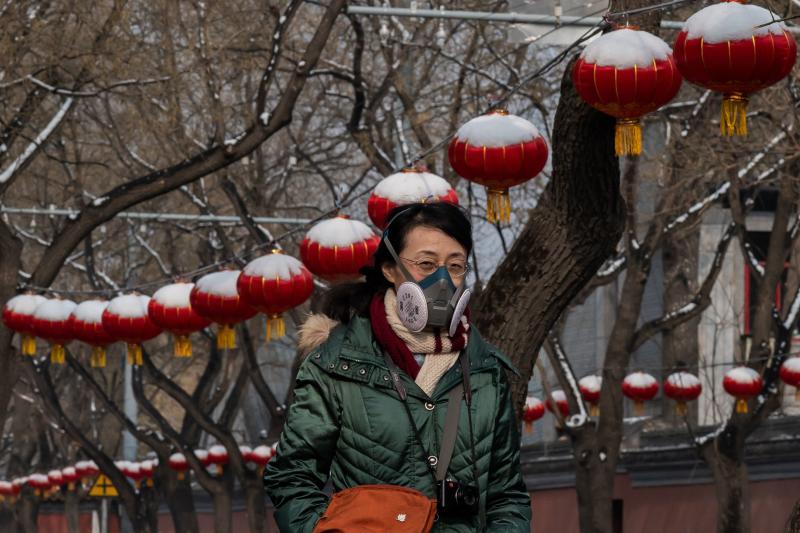Wuhan virus: Trump says US has ‘shut down’ virus threat as China shuns US help
Sign up now: Get ST's newsletters delivered to your inbox

A woman wearing a protective mask to prevent the spread of the new coronavirus walks on a street in Beijing on Feb 2, 2020.
PHOTO: AFP
WASHINGTON (REUTERS) - The United States has taken decisive action to protect Americans from the threat of a fast-moving coronavirus while offering help to China, US President Donald Trump said on Sunday (Feb 2), but a key adviser said Beijing had not accepted the offers of assistance.
Trump appeared to downplay concerns about the flu-like virus that has killed more than 300 people in China and spread to more than two dozen countries, telling Fox television in an interview, "We're gonna see what happens, but we did shut it down, yes."
Concerns about the virus spurred the United States to declare a public health emergency and bar entry to foreign nationals who have recently visited China.
Under new restrictions that go into effect at 5pm ET (2200 GMT) Sunday, US citizens who have travelled in China within 14 days will be directed to one of seven airports designated for screening.
"We can't have thousands of people coming in who may have this problem - the coronavirus," Trump told Fox during a short interview broadcast on Sunday. He said US officials had offered China "tremendous help" in dealing with the epidemic.
Trump's national security adviser, Robert O'Brien, in a separate interview, said China has been more open about the coronavirus than it has been in previous crises but had not yet accepted US offers of assistance.
"So far the Chinese have been more transparent certainly than in past crises and we appreciate that," O'Brien said in an interview with CBS's "Face the Nation." He said Beijing has still not responded to US offers of help from the Centers for Disease Control and Prevention and other health professionals.
"We've got tremendous expertise," O'Brien said. "This is a worldwide concern. We want to help our Chinese colleagues if we can and we've made the offer and we'll see if they accept the offer."
CDC officials have not been invited into China, but are in neighboring Kazakhstan to help guard against the spread of the virus, US Secretary of State Mike Pompeo said on Sunday during a visit there.
"You've got a long border with China which is where this disease has emanated from," Pompeo said in an interview with a Kazakh journalist. "And we've got our people from the Center for Disease Control right here on the ground, helping Kazakhstan deal with this so that you don't have an enormous outbreak."
China's National Health Commission said on Sunday the coronavirus has killed 304 people in China, and infections jumped to 14,380 as of Saturday.
At least 171 cases have been reported in more than two dozen other countries and regions, including the United States, Japan, Thailand, Hong Kong and Britain.
So far, eight cases of the fast-spreading virus have been confirmed in the United States, health officials said. The Pentagon is providing housing for people arriving from overseas who might need to be quarantined.
Americans who visited China's Hubei Province, epicenter of the coronavirus epidemic, will be subject to a mandatory quarantine of 14 days - the incubation period of the virus - upon entering the United States.
Americans who travelled to other parts of mainland China will undergo health screening and be asked to self-quarantine for up to 14 days.
Foreigners who have travelled in China within 14 days of their arrival will be denied entry.
Chad Wolf, US Homeland Security acting secretary, said the overall risk to the American public remains low.
The latest US patient, in Massachusetts, recently returned from Hubei, the CDC said. The coronavirus is believed to have originated in a market that traded illegally in wildlife in Hubei's provincial capital, Wuhan.


